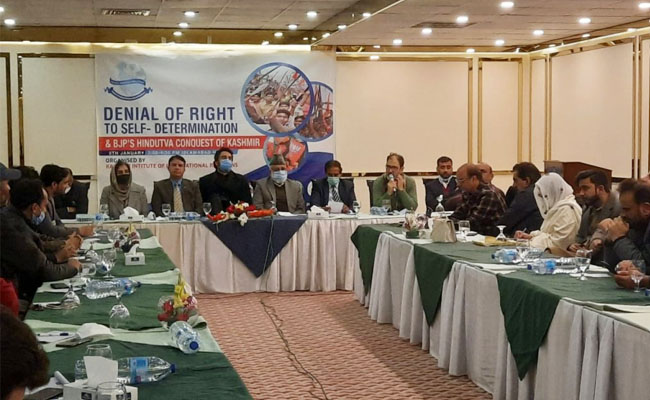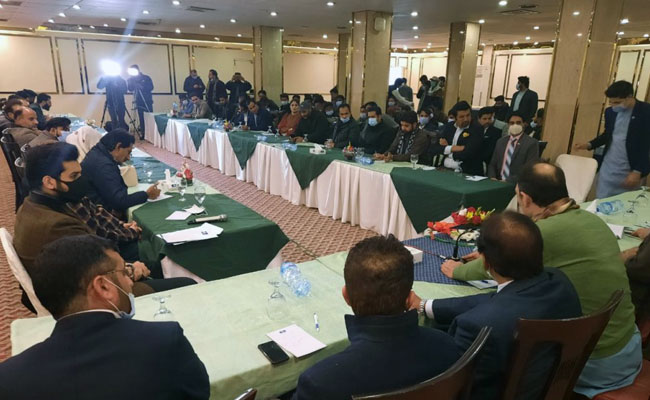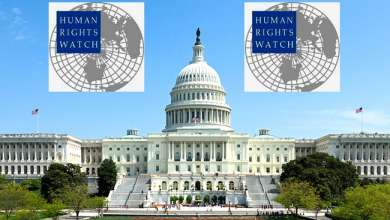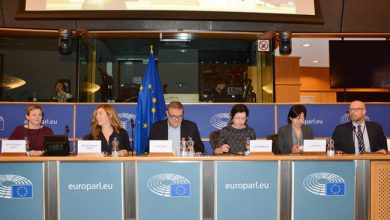Denial of right to self-determination is not only a violation of the UN resolutions but a negation of UN’s decolonisation agenda

KIIR seminar stresses on early resolution of K-issue as per UN resolutions “Denial of right to self-determination is not only a violation of the UN resolutions but a negation of UN’s decolonisation agenda”
Islamabad: Speakers at a seminar hosted by Kashmir Institute of International Relations (KIIR) here on Tuesday made a passionate appeal to the UN Security Council urging it to implement its resolutions that guaranteed right to self-determination to the people of Jammu and Kashmir. Held in connection with Right to self-Determination Day, the seminar titled “Denial of Right to Self-Determination & BJP’s Hindu Conquest of Kashmir” was attended and addressed by prominent rights activists, academicians, former diplomats, law experts and Kashmiri leaders hailing from both sides of the line of control (LoC) including Ms. Noureen Farooq Abrahim Khan, JI leader Abdul Rashid Turabi , PPP AJK president Ch. Abdul Latief Akbar, Syed Muhammad Ali Director CASSS, Prof. Dr. Muhammad Khan , Dr Owais Wasi , Dr. Qasir Raja ,Syed Faiz Naqshbandi , advocate Parveez Shah and Muhammad Ahmed Sagar. The event was chaired by Chairman Kashmir Institute of International Relations Altaf Hussain Wani , while Chairman Kashmir Committee Shaheryar Khan Afridi was chief guest but due to ill health could not speak.

In his opening statement the KIIR chief Altaf Hussain Wani while highlighting the dangerous dimensions of the Kashmir conflict said that India’s denial to grant Kashmiris their promised right was not only a violation of the UN resolutions but it was a negation of the UN’s
decolonization agenda that paved a way for successful culmination of freedom struggles in many parts of the world, including Asia. The same principle he said was applied for the resolution of Kashmir issue when it was brought into the notice of the highest body (UN) in 1948 by India after occupying a major portion of the erstwhile state of Jammu and Kashmir.
“The adoption of historic resolution on 5th January 1949 came as a great beacon-light of hope to millions of Kashmiris as they began to believe that the moment for their freedom was at hand and they too will finally receive justice so long denied to them by occupiers”, he said adding that Kashmiris’ cherished dream of freedom from foreign occupation was soon turned into a nightmarish ordeal by the crafty Indian rulers who brazenly violated the norms of international law and the commitments they made vis-à-vis holding plebiscite in the region.
Noureen Farooq Abrahim Khan MNA and member Kashmir committee stressed the need to establish a Kashmir desk at the foreign office and in embassies in all important countries and overseas Kashmiris should be involved in these desks.
Referring to India’s nefarious designs to alter the demography of Jammu and Syed Muhammad Ali Director Centre for Aerospace Security Studies said that within 17 months 2.2 million non-Kashmiris Hindus have been issue domiciles and in future 4 -5 million non-Kashmiris Hindus will be settled in IIOJK to completely distort the character of Kashmir issue.
Dr. Muhammad Khan Stressed the need to take timely and sustainable measures to resolve Kashmir issue, which he said has assumed dangerous proportions.
Dr. Owais Wasi said that a holistic review of the situation in the IOK should be taken so that a coherent strategy was evolved to stop Indian designs to change demography of Indian occupied Kashmir. He stressed the need to produce resistance literature to enlighten the population of Pakistan and the global community about the countless sacrifices of the people of Indian occupied Kashmir.
Dr. Qaiser Raja Said Pakistan will have to take concrete measures to support Kashmiris right to self-determination. The diplomatic, moral and political support has lost its importance under the current situation, especially after August 5, 2019. Indian has illegally annexed and occupied Kashmir and has put the whole population under siege.
The PPP leader Ch Latif Akber said the successive Indian rulers have ridiculously ignored and undermined the role of the UN and UNCIP and threw to the winds the solemn pledges they had made with the international community and the people of Jammu and Kashmir.
Advocate Pervez Shah said Indians had virtually blocked every attempt meant to resolve the conflict peacefully. Grabbing Kashmir completely by hook or by crook has been a preferred policy of the Indian rulers who did not even hesitate to suppress by the dint of force the
Kashmiris’ legitimate demands.
Syed Faiz Naqashbandi said that political activists and leaders were being persecuted for their expression of their conscientiously held political beliefs and for raising the banner of revolt against injustices and indiscrimination meted out to the people of Jammu and Kashmir at the hands of Indian authorities. On the other hand they said that the Indian government was using the judiciary as a tool to victimize Kashmiri prisoners who were arrested before and after 5th August
2019.
Abdul Rashid Turabi while highlighting the devastating impacts of the conflict on the indigenous population said that beyond deaths, the dispute has left Kashmiris completely paralyzed mentally and physically. Referring to the forced and illegal annexation of the disputed territory by the Indian government last year (2019) they said that the abysmal situation Kashmiris have undergone in the aftermath was sufficient enough to comprehend the perils of this dangerous conflict.
He pitched for intra Kashmir dialogue between all the stakeholders who opposed August 5, 2019 action of India as the first step to evolve a proper strategy against Indian occupation.
Wilson Wazir minority MP for KPK observed that the abysmal political and human rights situation in the occupied Kashmir needs a complete research towards a deeper understanding of nature of the conflict and the need for action on the necessary measures to end it in order to protect the Kashmiris’ right to self-determination that happens to be a cardinal principle of the UN Charter.





